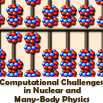Speaker
Stijn De Baerdemacker
Description
Configuration interaction methods for quantum many-body
systems are generally represented within Fock space, the
space spanned by all possible single-particle Slater
determinant (SD) wave functions. For strongly-correlated
quantum systems, the number of physically important SD basis
states quickly reaches beyond the capacities of present (and
future) computer hardware, due to the lack of correlations
within these SD basis states. Bases spanned by
Richardson-Gaudin (RG) eigenstates can be regarded as a
generalisation of Fock space, because the strong
correlations are inherently present within the basis states.
In this contribution, it will be shown how configuration
interaction methods can benefit from the use of RG bases
over conventional Fock space.

